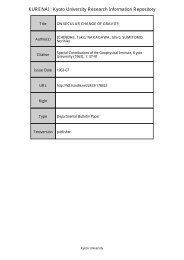The Study of American Censorship: An Interview with Louise Robbins
The Study of American Censorship: An Interview with Louise Robbins
The Study of American Censorship: An Interview with Louise Robbins
Create successful ePaper yourself
Turn your PDF publications into a flip-book with our unique Google optimized e-Paper software.
KURENAI : Kyoto University Researc<br />
Title<br />
<strong>The</strong> <strong>Study</strong> <strong>of</strong> <strong>American</strong> <strong>Censorship</strong> :<br />
<strong>Robbins</strong><br />
Author(s) Kawasaki, Yoshitaka<br />
Citation Lifelong education and libraries (2<br />
Issue Date 2001-03<br />
URL<br />
http://hdl.handle.net/2433/43587<br />
Right<br />
Type<br />
Departmental Bulletin Paper<br />
Textversion publisher<br />
Kyoto University
63<br />
<strong>The</strong> <strong>Study</strong> <strong>of</strong> <strong>American</strong> <strong>Censorship</strong>:<br />
<strong>An</strong> <strong>Interview</strong> <strong>with</strong> <strong>Louise</strong> <strong>Robbins</strong><br />
<strong>Interview</strong>ed by Yoshitaka Kawasaki<br />
1. Introduction<br />
<strong>The</strong> question <strong>of</strong> censorship in <strong>American</strong><br />
libraries is not only key to <strong>American</strong><br />
library history, but also to international<br />
scholars in a variety <strong>of</strong> fields since it was<br />
out <strong>of</strong> this experience that many <strong>of</strong> our<br />
current concepts <strong>of</strong> intellectual freedom<br />
have arrived.<br />
<strong>Louise</strong> S. <strong>Robbins</strong>, Associate Pr<strong>of</strong>essor<br />
and Director <strong>of</strong> the School <strong>of</strong> Library and<br />
Information Studies at the University <strong>of</strong><br />
Wisconsin-Madison in 1996 published<br />
<strong>Censorship</strong> and <strong>The</strong> <strong>American</strong> Library: <strong>The</strong> <strong>American</strong> Library Association's Response to<br />
(1)<br />
Threats to Intellectual Freedom, 1939-1969 (Greenwood, 1996). In July <strong>of</strong> 1998 I had just<br />
fini~hed translating this into Japanese. I was pleased that while on a research trip to the<br />
U.S., <strong>Robbins</strong> agreed to allow me to interview her in order to promote scholars' understanding<br />
<strong>of</strong> library censorship history and the importance <strong>of</strong> her pioneering volume.<br />
Pr<strong>of</strong>essor <strong>Louise</strong> S. <strong>Robbins</strong> was born in the capital <strong>of</strong> the United States, Washington D.C.,<br />
and went to public schools and college in Virginia. She was awarded an M.A from East Central<br />
University in Ada, Oklahoma, where she mainly studied English and then taught English.<br />
She taught and worked as a reading specialist at Byng School in Ada from 1975 to 1983.<br />
<strong>Robbins</strong> became interested in librarianship in 1981 while working in Ada, and pursued an<br />
MLS while continuing to teach and work in the school library. It was a 135 mile commute<br />
from her home in Oklahoma to Texas Woman's University, but she persisted and received<br />
her M.L.S in 1984. Later, <strong>Robbins</strong> worked for the East Central University Library from 1985<br />
to 1991. At the same time she was a doctoral student in library studies and obtained her<br />
Ph.D. from Texas Woman's University. Her dissertation is titled "Toward Ideology and<br />
Autonomy: <strong>The</strong> <strong>American</strong> Library Association's Response to Threats to Intellectual Freedom,<br />
(2)<br />
1939-1969."<br />
In the same year, 1991, <strong>Robbins</strong> accepted a position at the University <strong>of</strong> Wisconsin, Madison.<br />
She taught some classes and served as director <strong>of</strong> the library <strong>of</strong> the School <strong>of</strong> Library and<br />
Information Studies (SLIS). She ran the library as a laboratory, supervising various projects<br />
for practice and research. In 1997, she was tenured and was selected as Director <strong>of</strong> the<br />
School <strong>of</strong> Library and Information Studies, a position she continues to hold. In 1996,
64 Lifelong Education and Libraries<br />
Greenwood published a revised and expanded version <strong>of</strong> her dissertation as <strong>Censorship</strong> and<br />
the <strong>American</strong> Library .<br />
2. <strong>Interview</strong> Schedule<br />
<strong>The</strong> interview was conducted on the afternoon <strong>of</strong> July 29,1998 and lasted three hours in<br />
her <strong>of</strong>fice on the fourth floor <strong>of</strong> Helen C. White Hall, which houses SLIS. Her <strong>of</strong>fice features<br />
a gorgeous view <strong>of</strong> Lake Mendota outside a large window.<br />
I had not conveyed a detailed set <strong>of</strong> questions for the interview to her beforehand, so it was<br />
carried <strong>with</strong>out rehearsal in order to solicit her immediate impressions. <strong>The</strong> conversation<br />
was recorded on tape, and was directly transcribed by a student in the doctoral program at<br />
SLIS, <strong>An</strong>drew B. Wertheimer. NorikoAsato, Assistant Pr<strong>of</strong>essor <strong>of</strong> Japanese at the University<br />
<strong>of</strong> Nebraska in Lincoln, also accompanied them in order to help the interviewer's<br />
understanding <strong>of</strong> English.<br />
<strong>The</strong> interview was both a pleasant talk and also a fine example <strong>of</strong> scholarly communication<br />
on questions <strong>of</strong> methodology, interpretation <strong>of</strong> research and a variety <strong>of</strong> other topics. With<br />
that in mind, the interviewer thought that a more complete English version would be <strong>of</strong><br />
(3)<br />
interest to other researchers.<br />
<strong>The</strong> following interview does not replicate the entire dialogue. Topics such as discussion on<br />
the meaning <strong>of</strong> the concept <strong>of</strong> "intellectual freedom" and some personal details have been<br />
omitted.<br />
3. <strong>Interview</strong><br />
3.1 Reasons for Translating <strong>Robbins</strong> into Japanese<br />
Kawasaki Before the interview, you asked why I chose to translate your book. <strong>The</strong>re are<br />
three reasons. First, my own research centers on <strong>American</strong> library history, especially the<br />
development <strong>of</strong> intellectual freedom in libraries. In writing my 1995 study Toshokan no Jiyu<br />
(4)<br />
towa Nanika (<strong>The</strong> <strong>American</strong> Public Library and Intellectual Freedom) I utilized your<br />
dissertation "Ideology and Autonomy." I also translated the third and fifth editons <strong>of</strong> the ALA<br />
Intellectual Freedom Manual published in 1991 and 1997 respectively by the Japan Library<br />
(5)<br />
Association. As I mentioned, during my writing <strong>of</strong> Toshokan no Jiyu towa Nanika, I consulted<br />
your dissertation heavily. More and more, I wanted to translate your scholarly book on the<br />
history <strong>of</strong> the intellectual freedom in libraries.<br />
<strong>Robbins</strong><br />
N ow, I would like to ask you a follow-up question. Where did your initial interest<br />
in <strong>American</strong> libraries and intellectual freedom begin? How did you become interested in this<br />
in the first place?<br />
Kawasaki<br />
My initial interest came from my adviser, Pr<strong>of</strong>essor Chikao Ogura <strong>of</strong> Kyoto<br />
University, who was scholar <strong>of</strong> the history <strong>of</strong> <strong>American</strong> libraries. It is also important to<br />
understand that <strong>American</strong> ideologies and practices <strong>of</strong> librarianship have been a significant<br />
influence on those <strong>of</strong> Japan. Mter a short time lag, many philosophies, ideologies, and practices<br />
from all <strong>of</strong> the fields <strong>of</strong> library and information science have been introduced in Japan. So<br />
when we think <strong>of</strong> the future <strong>of</strong> the Japanese librarianship or society, generally it is very
<strong>The</strong> <strong>Study</strong> <strong>of</strong> <strong>American</strong> <strong>Censorship</strong>: <strong>An</strong> <strong>Interview</strong> <strong>with</strong> <strong>Louise</strong> <strong>Robbins</strong> 65<br />
helpful for us to learn from the U.S. example.<br />
My second reason for translating your book to was highlight your methodology; how you<br />
conducted research. You didn't just look at secondary materials and journals, but also you<br />
explored the ALAArchives and other depositories, conducted interviews and gathered personal<br />
letters, etc. I believe that this could serve as a useful methodological example for Japanese<br />
library researchers.<br />
Finally, in Japan, we have "Toshokan no Jiyu ni Kansuru Sengen" (A Statement on<br />
Intellectual Freedom in Libraries), a Japanese version <strong>of</strong> the Library Bill <strong>of</strong> Rights ~- and<br />
many <strong>of</strong> the ideas came directly from the <strong>American</strong> Library Bill <strong>of</strong> Rights. I wanted to show<br />
Japanese librarians what was the background to <strong>American</strong> Library Bill <strong>of</strong> Rights. I wanted<br />
to show what social contexts and struggles are behind those words.<br />
<strong>Robbins</strong> Yes, that is very important. I would assume that this influence <strong>of</strong> <strong>American</strong><br />
librartianship is mostly in the post-war period.<br />
Kawasaki Yes, in 1954 Japanese librarians took the <strong>American</strong> model <strong>of</strong> intellectual<br />
freedom. This is why I think it will be important for Japanese readers.<br />
3.2 Background <strong>of</strong> <strong>Robbins</strong>' Research<br />
Kawasaki<br />
I hope that you will not mind some critical questions on your work. I believe<br />
that your work is an important one and we should follow this up <strong>with</strong> an academic exploration.<br />
I also want to ask a few general questions on your book and then present more detailed<br />
questions. But, first I would like to collect a few details on your background. In 1983, you<br />
switched from being a reading specialist to an elementary school librarian. Why did you do<br />
this and didn't you need some certification for this?<br />
<strong>Robbins</strong><br />
I started back in school in 1981 to get an M.L.S. <strong>The</strong>re was a librarian <strong>with</strong> an<br />
M.L.S. and I worked under her, doing half-time reading and half~time library work--and also<br />
went to school at the same time. <strong>The</strong> commute to school was 135 miles each way, so my<br />
schedule was designed so that I could go to university every other Saturday. <strong>The</strong>y had classes<br />
on every other Saturday for 3 hours <strong>of</strong> credit. So, I could take 6 hours <strong>of</strong> credit in a semester<br />
if I was willing to drive to school every Saturday. I also went in the summer-time.<br />
In 1984, I had my M.L.S., but I also had a problem, which was that because I took my<br />
degree in Texas, the state <strong>of</strong> Oklahoma would not add the library certification to my teacher's<br />
certification unless I took a course in Texas government documents. Now, this won't make<br />
any sense to you, and it didn't make any sense to me, but it was the result <strong>of</strong> a reciprocal<br />
agreement on transferring certification. I thought that was ridiculous. I had been teaching<br />
in Oklahoma for ten years, why couldn't they just add my library certification. But they<br />
wouldn't do that, so I found a job in an academic library. I did it because I was mad at the<br />
State Board <strong>of</strong> Education, not because I didn't like school libraries, and thought I shouldn't<br />
have to take Texas government. Of course, my M.L.S. was recognized at the college, and I<br />
was very happy doing college library work.<br />
Kawasaki<br />
<strong>Robbins</strong><br />
Did you write a thesis for your M.L.S.?<br />
Texas Woman's University has an optional pr<strong>of</strong>essional paper, which isn't as
66 Lifelong Education and Libraries<br />
difficult as a thesis. I didn't write a historical paper, but instead wrote on managing<br />
microcomputer laboratories, as that was one <strong>of</strong> my tasks at the time. I didn't have anything<br />
to do <strong>with</strong> history at the time, and didn't actually get into historical research until I was<br />
working on my dissertation. I was led to that because I had started approaching the topic<br />
from a policy approach. I was looking at censorship and intellectual freedom first from a<br />
policy perspective, and then I became increasingly interested in the historical approach to<br />
that question. So, I kind <strong>of</strong> came at it from the back door, but I have always been a lover <strong>of</strong><br />
history.<br />
Kawasaki<br />
<strong>The</strong> names <strong>of</strong> your dissertation committee members (B. Keith Swigger, Frank<br />
Turner etc.) are not so well known for library history or research on intellectual freedom.<br />
What was it like working <strong>with</strong> them?<br />
<strong>Robbins</strong><br />
<strong>The</strong> person who had been my adviser all the way through graduate school was<br />
Frank Turner, and he is a historian, but he was very ill. He did not want to be my dissertation<br />
adviser because <strong>of</strong> fears he would not make it to the end. So, although Frank was on my<br />
committee, I picked Keith Swigger, who has a degree in <strong>American</strong> Studies, as I knew that he<br />
would give me good advice and keep me on schedule. I knew that Keith would help me to get<br />
finished because he would trust me to do the research adequately and wouldn't check every<br />
detail. He also wouldn't have me drive the three hours to show him the next two pages. It<br />
was a very practical decision as the only historian on the faculty was the one who was ill.<br />
Frank was the historian on my committee. I also had a political scientist on my committee<br />
who had a great intest in intellectual freedom, constitutional law, and the McCarthy period,<br />
which as you know is the period I am focusing on. <strong>The</strong> two <strong>of</strong> them and my dissertation<br />
adviser were the ones who helped the most.<br />
Kawasaki Was Texas Woman's University a good environment to study in?<br />
<strong>Robbins</strong> For me, it was very good for a few reasons. One is Frank Turner, who was a<br />
person -- you know how sometimes you have a "meeting <strong>of</strong> the minds" where something<br />
happens so that you can understand each other very well. He was such a person for me, one<br />
<strong>with</strong> whom I could talk very easily. He made me think. I took every course he <strong>of</strong>fered. I am<br />
sure that I became interested in conducting historical research partly because <strong>of</strong> him. For<br />
another reason, even though at the graduate level, Texas Woman's University isn't just for<br />
women, it was a very good environment for working women. For example, during my master's<br />
work, as I told you, I could take courses on Saturdays and summers. I finished all <strong>of</strong> my<br />
degree work while I was working full time. When I was working on my Ph.D. I could leave<br />
my <strong>of</strong>fice around 3:00 on a Monday afternoon, drive to Texas and take a class that night. I<br />
could then stay at the university dorm for $13. I'd get up the next morning and take classes<br />
and do research, and then be home by midnight. I took 9 hours <strong>of</strong> credit a semester that way.<br />
Kawasaki<br />
You came to Madison in 1991. What did you do before becoming Director <strong>of</strong><br />
the School <strong>of</strong> Library and Information Studies?<br />
<strong>Robbins</strong><br />
I taught one class and was the Director <strong>of</strong> the Teaching Library, supervising<br />
many projects as a laboratory for research. It was a new position and I was the first person to<br />
hold it. Unless we get lucky <strong>with</strong> funding, I may have been the last person too. I had that job
<strong>The</strong> <strong>Study</strong> <strong>of</strong> <strong>American</strong> <strong>Censorship</strong>: <strong>An</strong> <strong>Interview</strong> <strong>with</strong> <strong>Louise</strong> <strong>Robbins</strong><br />
67<br />
until last year, when I received tenure and was promoted to 8LI8 Director.<br />
3.3 <strong>Censorship</strong> and <strong>The</strong> <strong>American</strong> Library - General Questions<br />
3.3.1 Purpose <strong>of</strong> the study<br />
Kawasaki When you started doing<br />
historical research, what was the original<br />
focus <strong>of</strong> what became an eight year study?<br />
<strong>Robbins</strong> When I first started I had read<br />
Evelyn Geller's Forbidden Books in<br />
(6)<br />
<strong>American</strong> Public Libraries (1984), which<br />
brings the concept to 1939, and I was very<br />
much interested in how we got from 1939 to<br />
1969. How did we get from that Library's<br />
Bill <strong>of</strong> Rights, which in 1939 doesn't even<br />
mention censorship, to the Freedom to Read<br />
Foundation in 1969? I had done a little reading. Actually, the timeline which is in the back <strong>of</strong><br />
the book, is almost the first thing that I did, although it obviously had much less detail in it.<br />
I thought it would be fascinating to be able to see what made all <strong>of</strong> these different ALA<br />
statements happen. Why did they say this at a particular time? How did the Vietnam War<br />
effect this? How did X effect this? I really wanted to see how this debate had occurred and<br />
how it effected the pr<strong>of</strong>ession. Evelyn Geller is much more sophisticated in her treatment<br />
than I am in mine; she had a much better theoretical background in sociology certainly and<br />
she had looked at intellectual freedom as a way <strong>of</strong> saying "keep your hands <strong>of</strong>f my library."<br />
Librarians were saying this is our job, not your job to select books. It was a way <strong>of</strong> establishing<br />
pr<strong>of</strong>essional autonomy and I wanted to see if that was still part <strong>of</strong> the language librarians<br />
used or if there was something else going on instead. In my time in librarianship, we have<br />
been very much focused on intellectual freedom issues. I mean this is what you read about if<br />
you pick up any library publication--the issues are censorship cases and Internet filtering. I<br />
wanted to know when that change happened.<br />
Kawasaki Besides Geller, what else motivated you to do the study? Had you ever been<br />
involved in a censorship case?<br />
<strong>Robbins</strong> I've always been a civil libertarian. I guess that's part <strong>of</strong> it. I have a strong<br />
personal belief in intellectual freedom. I knew that I would be living <strong>with</strong> my dissertation<br />
topic for a long time and wanted something I would feel good about investing my time and<br />
energy in.<br />
3.3.2 On a Chapter Title<br />
<strong>Robbins</strong> One little item. <strong>The</strong>re is a mistake in this book and I don't know whether you<br />
found it or not. Do you see "No Bark, Very Little Bite." This should say "No Bite, Very Little<br />
Bark" and nobody ever caught it, even me.<br />
Kawasaki I noticed this because I read both your dissertation and the published book
68 Lifelong Education and Libraries<br />
thoroughly and compared each other. <strong>The</strong> chapter name "No Bark, Very Little Bite" doesn't<br />
make sense. So I pointed out this typesetting error in the Japanese version.<br />
<strong>Robbins</strong><br />
I think it was changed in the typesetting. I think that now you are the only one<br />
who knows. I haven't said anything about this to anyone and no-one has mentioned this to<br />
me.<br />
Kawasaki<br />
interview.<br />
<strong>Robbins</strong><br />
Now, all Japanese [and English speaking] readers will know, thanks to this<br />
Good.<br />
3.3.3 Focus on ALA<br />
Kawasaki When I first read your dissertation, I thought that it was written by a former<br />
ALA staff member as you focus so much on the role <strong>of</strong> the organization. Also, you use a very<br />
orthodox historical technique, which was one reason why I was interested in your book.<br />
<strong>Robbins</strong><br />
I use an orthodox historical descriptive technique because it is the one I know.<br />
I rely heavily on ALA materials, largely because that was what was available. I added<br />
materials from David Berninghausen and Archie McNeal, although they were ALA committee<br />
members. <strong>The</strong> people who would have known about ALA statements were people <strong>with</strong>in<br />
ALA. Other things happened, but I wanted to know how the <strong>of</strong>ficial statements were made,<br />
so I had to look through the organization which built this response.<br />
Kawasaki<br />
I recognize the importance <strong>of</strong> focusing on the ALA, but might that not also be<br />
a limitation <strong>of</strong> your study in that you focus on the organization rather than the pr<strong>of</strong>ession at<br />
large? Maybe a better way to phrase this would be to ask you what weaknesses do you see in<br />
the work, or what areas need further research?<br />
<strong>Robbins</strong> Well, I don't know how you'd get a hold <strong>of</strong> the rest <strong>of</strong> the pr<strong>of</strong>ession. How would<br />
(7)<br />
you study it? I think that a study like Marjorie Fiske's study (1959) <strong>of</strong> California librarians,<br />
which is a sociological investigation, certainly tells what librarians were doing, and tells the<br />
differences between those who belongs to pr<strong>of</strong>essional associations and those who don't. I<br />
think that it would be hard to trace this historically--how to gather records or determine how<br />
representative anyone librarian was. However, if you look at the pr<strong>of</strong>essional associations,<br />
they at least ostensibly speak for their members in some way. No, we don't really know how<br />
much in the long run, though people like Paul Bixler and Bill Dix, and other chairs <strong>of</strong> the<br />
Intellectual Freedom Committee knew very well that they weren't speaking for everyone<br />
and that there was a big gap between the statements and practice. I think the only way to<br />
look at what mayor may not have been a part <strong>of</strong> the pr<strong>of</strong>ession would be to do case studies.<br />
I would love to have more ideas about this.<br />
Kawasaki I asked you this question because in library history studies I think it is<br />
necessary to employ the bottom-up approach <strong>with</strong> wider a social perspective in mind. As you<br />
pointed out, case studies and biographical studies <strong>with</strong> social contexts as well as social history<br />
approaches would contribute much to this direction.
<strong>The</strong> <strong>Study</strong> <strong>of</strong> <strong>American</strong> <strong>Censorship</strong>: <strong>An</strong> <strong>Interview</strong> <strong>with</strong> <strong>Louise</strong> <strong>Robbins</strong><br />
69<br />
3.3.4 <strong>The</strong> Dissertation vs. the Published Work<br />
Kawasaki<br />
When you changed the text<br />
from the dissertation to a published work, I<br />
noticed that chapter five, "the Ideology <strong>of</strong><br />
Librarians" was greatly expanded and<br />
revised. What other changes did you make?<br />
<strong>Robbins</strong> Do you see these things [green<br />
tabs]? When I went up for tenure, I had to<br />
send my book up, and I had to say how it<br />
had been expanded from my dissertation, so everywhere I added something I put stickies<br />
and explained the changes, so the committee wouldn't have to guess. <strong>The</strong> last chapter is<br />
actually expanded a great deal by the request <strong>of</strong> the publisher. Greenwood Press wanted to<br />
have me bring it up to date. I didn't feel entirely comfortable <strong>with</strong> this as I would have to just<br />
skim a lot <strong>of</strong> years.<br />
<strong>The</strong> part on loyalty investigations was greatly expanded because I did the research in the<br />
(8)<br />
Library <strong>of</strong> Congress, and I expanded the section on propaganda in public libraries quite a bit<br />
(9)<br />
<strong>with</strong> the Ralph Ulveling papers. I think those were the two main areas where I made changes<br />
along <strong>with</strong> the use <strong>of</strong> the term jurisdiction, which is Abbott's concept. In terms <strong>of</strong> interpretive<br />
(10)<br />
frap1ework <strong>An</strong>drew Abbott becomes more important than Michael Winter in the book <strong>The</strong><br />
(11)<br />
Culture and Control <strong>of</strong> Expertise, whereas Abbott wasn't even in my dissertation.<br />
Kawasaki<br />
<strong>Robbins</strong><br />
Did the publisher dictate how they wanted chapter five to look like?<br />
No, they just said please bring it up to date, so we know what happened since<br />
1969. Obviously, you can't analyze that many years historically in such a few pages, but they<br />
only wanted a quick capsule to bring it up to date.<br />
3.3.5 Periodization<br />
Kawasaki Generally, an <strong>American</strong> dissertation includes a statement <strong>of</strong> the problem, a<br />
review <strong>of</strong> the literature, and so on. However, your dissertation doesn't contain much <strong>of</strong> a<br />
review <strong>of</strong> the literature. Was that mostly a reflection <strong>of</strong> the literature at the time?<br />
<strong>Robbins</strong> <strong>The</strong>re was no literature; I mean no secondary sources other than the few I<br />
mention in the introduction. Geller's book certainly was primary and there are some sources<br />
outside library literature which deal <strong>with</strong> the history <strong>of</strong> intellectual freedom. <strong>The</strong>re are tons<br />
<strong>of</strong> them, but it would seem somewhat pointless to review all <strong>of</strong> them. You'd have to go into<br />
constitutional law and history, and they don't really deal <strong>with</strong> my topic at all. I really did a<br />
very thorough literature search and there really wasn't any research literature to critique on<br />
this topic at all--certainly not for the time period I was interested in. David Berninghausen's<br />
(12)<br />
writings, his Flight from Reason (1975), that was about it.<br />
Kawasaki<br />
I agree. I found <strong>The</strong> Flight from Reason interesting but not so much as research.<br />
<strong>The</strong> other reference can be more general, such as the opening article <strong>of</strong> the ALA Intellectual<br />
(13)<br />
Freedom Manual by Judith F. Krug and James Harvey.<br />
You know how important the question <strong>of</strong> periodization is for historians. Your books has the
70 Lifelong Education and Libraries<br />
following chapters;<br />
Chapt.1: No Bark, Very Little Bite, 1939-48<br />
Chapt. 2: Book Banning and Witch Hunts, 1948-52<br />
Chapt. 3: Belief Meets Practice, 1952-60<br />
Chapt.4: More Than Lip Service, 1960-1969<br />
I am wondering why you divided chapters two and three, which both seem to deal <strong>with</strong> the<br />
same period, and are the key period <strong>of</strong> the book.<br />
<strong>Robbins</strong><br />
I had a big debate on the chapter two-three division. In a way, I wanted to have<br />
them together, but that wasn't exactly right either. It was just one <strong>of</strong> those things where I<br />
had to make a decision -- not a perfect one -- but a decision. This was a kind <strong>of</strong> pivot time.<br />
Berninghasusen was the pivot time; his leadership really got the Intellectual Freedom<br />
Committee <strong>of</strong>f dead center and forced it to deal <strong>with</strong> issues. His leadership came at a time<br />
when such leadership was called for. If he had been an "institutional type" it might not have<br />
happened, but Berninghausen was a "young Turk;" he was somebody who wasn't a part <strong>of</strong><br />
the establishment and so he wasn't afraid to take on the more conservative people in the<br />
organization. That I think is the main reason why ALA responded <strong>with</strong> the IFC to so many<br />
specific McCarthyist efforts (such as Resolution on Loyalty Programs (1950), revision <strong>of</strong> the<br />
Library Bill <strong>of</strong> Rights (1948), the Statement on Labeling (1951)). So many things were<br />
responses to specific McCarthyist kind <strong>of</strong> events happening at that time. It is almost like the<br />
first part <strong>of</strong> chapter three could have gone in there too and then gone somewhere else, but<br />
there wasn't an easy breaking point, so I chose one. That date changed back and forth from<br />
1952 to 1953 about ten times as I was writing. I don't have an easy answer for that and you<br />
might find another way <strong>of</strong> doing that.<br />
Kawasaki <strong>The</strong> Statement <strong>of</strong> Labeling (1951) was included in chapter two and the Freedom<br />
to Read Statement (1953) is in Chapter three.<br />
<strong>Robbins</strong> Right, there are just two years difference between them.<br />
Kawasaki <strong>The</strong>se came from the same socio-historical background. If we take a look at<br />
Chapter four, you cut <strong>of</strong>f this year according to the new theme, which is free speech. What<br />
are your justifications for the periodization? Your periodization confused me by cutting <strong>of</strong>f<br />
sometime by person (e.g., Berninghausen), another time by social movement (e.g., civil rights<br />
movement).<br />
<strong>Robbins</strong><br />
In chapter three, "Belief Meets Practice," again, there are lots <strong>of</strong> possible ways<br />
to divide this and I changed this more than once. I saw this as a place, where, after<br />
Beninghausen sort <strong>of</strong> got statements made, a huge challenge, one which had national or<br />
world attention in the Overseas Library controversy comes along and librarians get this<br />
(Overseas Libraries Statement, 1953), as someone said, swift public eminence (<strong>with</strong> the<br />
Freedom to Read Statement). <strong>The</strong>y became sort <strong>of</strong> famous overnight and they were<br />
congratulating themselves and the rest <strong>of</strong> the chapter asks if they really should have been<br />
congratulating themselves. In a way, chapters two and three should have been one chapter.<br />
<strong>The</strong>y are all McCarthyist, or intense Cold War era responses.<br />
Kawasaki Generally, historians write that the McCarthy period or the Cold War era are
<strong>The</strong> <strong>Study</strong> <strong>of</strong> <strong>American</strong> <strong>Censorship</strong>: <strong>An</strong> <strong>Interview</strong> <strong>with</strong> <strong>Louise</strong> <strong>Robbins</strong> 71<br />
one period (or set <strong>of</strong> periods), but that they are distinct from other periods, such as Civil<br />
Rights. Actually both eras fall on each other but are divided at the same time, as your book's<br />
timeline shows.<br />
<strong>Robbins</strong><br />
My experience as I read the literature is that this is a false break. For example,<br />
the weapon <strong>of</strong> McCarthyism was used against integrationists. <strong>The</strong>re is a very close relationship<br />
between segregation and McCarthyism. That's very much a feature <strong>of</strong> the next book-how<br />
(14)<br />
they went hand in hand [This book, titled <strong>The</strong> Dismissal <strong>of</strong> Miss Ruth Brown]. You can see<br />
this in the Warren Court (1953-1969), where Supreme Court Justice Earl Warren was called<br />
a Communist because he overturned school segregation in the Brown v. Board <strong>of</strong> Education<br />
(1954) decision, so there is a close relationship. But integration didn't surface in the library<br />
literature to any extent at all until 1960. It is there in society, but librarians were not paying<br />
attention to it. So, in terms <strong>of</strong> looking at library history, it is an undercurrent, but it is not<br />
surfacing and it is not soliciting a response in the pr<strong>of</strong>essional association, so yes and no.<br />
<strong>The</strong> McCarthy Era, and maybe we should call it something else, but when I am talking<br />
about McCarthyism personally, it reflects my own reading <strong>of</strong> the early years <strong>of</strong> the Cold War,<br />
up until about 1960. <strong>The</strong> Cold War is a much longer period. McCarthyism started before<br />
McCarthy and went after him, but the kind <strong>of</strong> tactics probably began waning in 1954 - 1956<br />
and were sort <strong>of</strong> out the door by 1960, but at least to a.ny great extent. I am now reading<br />
(15)<br />
Ellen W. Schrecker's Many Are the Crimes: McCarthyism in America (1998) and I know that<br />
some people were still suffering from the effects <strong>of</strong> McCarthyism in 1968 - 1970, so it wasn't<br />
a clear break by any means.<br />
Kawasaki<br />
I understand what you mean. As I said before, I can see the importance <strong>of</strong><br />
Berninghausen, too. But still, the break in 1952 does not provide clear criteria to satisfY me.<br />
3.4 <strong>Censorship</strong> and the <strong>American</strong> Library - Specific Questions<br />
3.4.1 Definition <strong>of</strong> "intellectual freedom"<br />
Kawasaki In your book's introduction, you utilized Beninghausen's definition <strong>of</strong><br />
"intellectual freedom." If we discuss the concept <strong>of</strong> the term, it will make our discussion<br />
much more complex. So I will only touch on the "use" <strong>of</strong> the term briefly. I was wondering<br />
how you see this term used outside <strong>of</strong> the library field. Mter all, it is neither in the Oxford<br />
English Dictionary nor is accepted as a legal term. On the other hand, we sometimes find the<br />
term in the education field and in civil liberties discourse, but these fields use the term much<br />
more infrequently than we do in librarianship. Would you say that "intellectual freedom" is<br />
"jargon" for library science alone.<br />
<strong>Robbins</strong><br />
I'm trying to think where else I've heard it. I hear for example, the <strong>American</strong><br />
Civil Liberties Union using it, but I wonder. I had wondered about the origins <strong>of</strong> the term<br />
before and should go back to the sources as to where the term gained currency or became<br />
popular. I mean the name <strong>of</strong> the committee established in 1940 was the Committee on<br />
Intellectual Freedom to Safeguard the Rights <strong>of</strong> Library Users to Freedom <strong>of</strong> Inquiry. That's<br />
long, long term. It may be that is the origin <strong>of</strong> the term. I wonder if it is, and if it was used<br />
freely before that time. If so, it should show up in the literature <strong>of</strong> Nazism, for example.
72 Lifelong Education and Libraries<br />
Maybe it came out as a reaction to it. Perhaps the term is as much a "creature <strong>of</strong> that time<br />
period" as the Library Bill <strong>of</strong> Rights is.<br />
Kawasaki Did the library field invent the term intellectual freedom then?<br />
<strong>Robbins</strong> That might be the case. I don't know if they might have borrowed it from the<br />
literature on Nazism. <strong>The</strong>re is a book I really like, Robert B. Fowler's Believing Skeptics<br />
(16)<br />
1975, which talks about the intellectual history <strong>of</strong> this time period and the way liberals saw<br />
themselves, or the U.S. saw itself as being free <strong>of</strong> ideology and actually as afraid <strong>of</strong> ideology<br />
and wanting to be free <strong>of</strong> them as it was seen as contrary to intellectual freedom.<br />
3.4.2 Library's Bill <strong>of</strong> Rights (1939) and World War II<br />
Kawasaki<br />
Concerning the Des Moines Public Library's "Bill <strong>of</strong> Rights for the Free Public<br />
Library" adopted in 1938, I was wondering if you looked for archival materials when you<br />
wrote this part?<br />
<strong>Robbins</strong> <strong>The</strong> Des Moines Public Library was undergoing asbestos abatement and they<br />
said that maybe they had something and looked what they could find - and they sent me<br />
some things. Later, I found a little more elsewhere.<br />
Kawasaki<br />
You cited Christine Jenkins' dissertation, "<strong>The</strong> Strength <strong>of</strong> the Inconspicuous,"<br />
in that section, and wrote in the footnote that you had received information from Jenkins<br />
personally. In the text itself, you only mentioned Des Moines Public Library as an active<br />
center <strong>of</strong> adult education. Those seem to be somewhat weak as a rationale to explain why the<br />
Des Moines Public Library adopted the "Bill <strong>of</strong> Rights for the Free Public Library." Did a<br />
specific incident at the Des Moines Public Library occur which led the library to adopt the<br />
statement? I would appreciate if you could give us a more detailed explanation <strong>of</strong> the<br />
background.<br />
<strong>Robbins</strong> What Jenkins identified in the archives for me were materials pertaining to an<br />
adult education committee <strong>of</strong> which Forrest Spaulding was a member.<br />
Kawasaki Does "an adult education committee" mean the Adult Education Board <strong>of</strong> the<br />
ALA?<br />
<strong>Robbins</strong> Yes, and they are the ones who proposed the Library's Bill <strong>of</strong> Rights, adopted it<br />
for themselves and actually proposed it <strong>with</strong> more teeth than the way it was finally approved.<br />
<strong>The</strong>y were using the Public Mfairs Pamphlets, for example, which dealt <strong>with</strong> controversial<br />
topics and they were apparently getting into a little bit <strong>of</strong> trouble themselves. We don't have<br />
enough evidence to know that, but that is our hunch. Basically, they were discussing these<br />
controversial pamphlets in the library adult discussion groups. This was part <strong>of</strong> the reason<br />
why they wanted this Library Bill <strong>of</strong> Rights, to protect and say that it was the right thing to<br />
do. So, what she identified is quite relevant.<br />
Kawasaki I understand what you mean. But, it seems to me that there is no evidence<br />
that the Des Moines Public Library actually used those controversial pamphlets and received<br />
complaints which may have led to the adoption <strong>of</strong> the intellectual freedom statement. In any<br />
case, do you think that there is more there to be unearthed on this question?<br />
<strong>Robbins</strong> I don't know the answer to that question. I think that Patti Becker may have<br />
(17)
<strong>The</strong> <strong>Study</strong> <strong>of</strong> <strong>American</strong> <strong>Censorship</strong>: <strong>An</strong> <strong>Interview</strong> <strong>with</strong> <strong>Louise</strong> <strong>Robbins</strong> 73<br />
gone to Des Moines. She is [a dissertator under Wayne A. Wiegand and is] working on<br />
<strong>American</strong> public libraries in World War II. She talked about Des Moines <strong>with</strong> me, so she may<br />
have gone there.<br />
Kawasaki<br />
On a related question. Why don't you deal very much <strong>with</strong> library issues<br />
during WWII? Is that because <strong>of</strong> your focus on the IFC perspective rather than ALA's?<br />
<strong>Robbins</strong><br />
Well, I didn't try to encompass everything that was happening in ALA. That's<br />
at least one whole book, maybe even two or three. I wanted to look at what was happening in<br />
terms <strong>of</strong> intellectual freedom issP.es and because librarians didn't travel since there was<br />
rationing <strong>of</strong> gasoline and not much was published due to paper shortages. People just laid<br />
low until the war's end. <strong>The</strong>y were quite occupied by the war effort and seemed not to have<br />
been thinking or talking about much else. So, there isn't much to discuss about this period in<br />
terms <strong>of</strong> intellectual freedom.<br />
Kawasaki As you know, during World War I the ALA was active in censoring books for<br />
its Army Camp libraries etc., which has been brought out, for example, by James Martins'<br />
(IS)<br />
<strong>An</strong> <strong>American</strong> Adventure in Book-Burning (1988), which analyzes this. Between WWI and<br />
WWII, ALA adopted the Library Bill <strong>of</strong> Rights. <strong>The</strong>re was a big change in between the two<br />
wars, in terms <strong>of</strong> the ideology or the raison d'etre <strong>of</strong> libraries. Do you think that ALA changed<br />
its overall attitude to censorship in this period?<br />
<strong>Robbins</strong><br />
I understand what you are asking. But there is no written record that I have<br />
been able to find. Now, I didn't look at every file, but concentrated on the ALA Executive<br />
Council and other likely places, along <strong>with</strong> published library literature in those three main<br />
journals (Library Journal, <strong>American</strong> Library Association Bulletin, Wilson Library Bulletin),<br />
and the IFC. When I had a hint that there might be something elsewhere I'd go pursue it. I<br />
also used the files <strong>of</strong> people who chaired the IFC to the extent available. I know, for example<br />
that the Armed Forces Editions had books that had titles that were later censored in the<br />
Overseas Libraries, which were distributed very widely. I don't know what happened to them.<br />
Not much emerged from the literature about censorship. For example, in "WWI, German<br />
language books were pulled <strong>of</strong>f <strong>of</strong>library shelves. I don't have evidence <strong>of</strong> this kind <strong>of</strong> activities<br />
although it might have also happened in WWII.<br />
Kawasaki <strong>The</strong> ALA papers for WWI are well organized, but the WWII papers seem to be<br />
much more poorly done. Does this situation affect your research?<br />
<strong>Robbins</strong><br />
I didn't spend a lot <strong>of</strong> time on records pertaining to ALA's war activities. As I<br />
said, I concentrated on the IFC and looked elsewhere when I had hints <strong>of</strong> related events. So,<br />
I can't speak from first-hand knowledge, and you might want to check <strong>with</strong> Patti Becker on<br />
this. I do know that for example, libraries became more information centers and did promote<br />
different kinds <strong>of</strong> things, such as rationing (e.g.,ways to cook <strong>with</strong>out sugar), and the like. I<br />
know that this happened during the war. I don't know about censorship.<br />
Kawasaki<br />
I understand how the general progress <strong>of</strong> a research and the excavation <strong>of</strong><br />
materials can influence the whole research itself. On the other hand, as you entitled the book<br />
"<strong>Censorship</strong> and the <strong>American</strong> Libraries," I wish more explanation could have been <strong>of</strong>fered<br />
about the WWII period.
74 Lifelong Education and Libraries<br />
3.4.3 On the "Statement <strong>of</strong> Labeling."<br />
Kawasaki<br />
On page 53 <strong>of</strong> your book, you reproduce the entire text <strong>of</strong> "Statement <strong>of</strong><br />
Labeling" adopted in 1951. At the end <strong>of</strong> the text, there is an expression that "We are, then,<br />
anti-communists." Do you think that it was meant literally or simply as a line to protect<br />
librarians?<br />
<strong>Robbins</strong> That was a very common assumption. That was the only safe thing to say. You<br />
(19)<br />
should look at the July 1996 Library Trends article, which deals <strong>with</strong> this. I think it was<br />
literal in that they were opposed to Communists. ALA really bought into the notion that we<br />
don't have ideologies and Communism is an ideology. I don't think it was an effort to place<br />
themselves on the political spectrum. It was just saying that we oppose any ideology that<br />
seeks to undermine the United States. However, I think they also meant that they really<br />
were anti-Communist. That entire sentence reads "Because communism, fascism, or other<br />
authoritarianisms tend to suppress ideas and attempt to coerce individuals to conform to a<br />
specific ideology,<strong>American</strong> librarians must be opposed to any such 'ism.' We are, then, anticommunist."<br />
That is as clear a statement <strong>of</strong> civil libertarianism as you could make in that<br />
period. It is kind <strong>of</strong> a capsule <strong>of</strong> what almost all <strong>of</strong> the liberal intellectuals would have said in<br />
that time.<br />
3.4.4 Racial Segregation<br />
Kawasaki<br />
In the history <strong>of</strong> education, the Brown decision (1954) is a major event; however,<br />
in library literature and the ALA there seems to be no suggestion <strong>of</strong> the problem <strong>of</strong> segregation<br />
until 1960. Do you think that this is because ALA <strong>of</strong>ficials were uninterested or didn't want<br />
to become involved in local issues or why was this so? Of course, there were a few exceptions<br />
to this situation. For example, the racial problems that occurred at the ALA annual conference<br />
(1936) in Richmond, Virginia led the ALA to decide not to hold a meeting in a city where<br />
racial segregation would be enforced in the facilities under ALA control.<br />
<strong>Robbins</strong> I think that <strong>of</strong>ficially it was because they didn't want to get involved in local<br />
issues, and perhaps in some cases that was the actual reason. It also partly is because if they<br />
made too much <strong>of</strong> a fuss about it the Southern states would all <strong>with</strong>draw and they would lose<br />
members and that means money. Money seems to have driven ALA for about half <strong>of</strong> its life. It<br />
was scared to death that it was going to spend too much money supporting intellectual freedom.<br />
<strong>The</strong>y were scared to death they would lose members. In fact, though, they found that when<br />
they supported their own beliefs they gained members, but they didn't have faith in themselves<br />
in that regard. In some cases though I think that it was simply that some were racist.<br />
Finally, it was southerners who brought it up. It was Dan Lacy and Archie McNeal who were<br />
the people <strong>with</strong>in ALA who carried the ball. It was a British editor, Eric Moon, who brought<br />
it to the top <strong>of</strong> the agenda.<br />
Kawasaki<br />
I want to clarify a bit more on what you said regarding the idea <strong>of</strong>local issues.<br />
<strong>The</strong> ALA said many times that they wouldn't intrude on local issues. Was this done so Southern<br />
librarians would not have to violate state or local segregation laws?
<strong>The</strong> <strong>Study</strong> <strong>of</strong> <strong>American</strong> <strong>Censorship</strong>: <strong>An</strong> <strong>Interview</strong> <strong>with</strong> <strong>Louise</strong> <strong>Robbins</strong> 75<br />
<strong>Robbins</strong> <strong>The</strong>re were actually laws in the Southern states that forbid whites and blacks<br />
from using the same facilities, and they said we can't encourage librarians to violate the<br />
laws. It was legal separation <strong>of</strong> the races and the expression that we use to talk about this is<br />
"Jim Crow Laws," laws which were designed to legally separate the races in education, and<br />
transportation, public accommodations, and all places---restaurants, hotels, water fountains,<br />
trains, whatever.<br />
3.4.5 <strong>The</strong> Richard Kreimer Case<br />
Kawasaki In Chapter Five, you extended your book to a summary <strong>of</strong> the current situation.<br />
I thought that this more capsulized examination distracted readers from your earlier historical<br />
narrative.<br />
<strong>Robbins</strong> Well, as I told you before, it is because the publisher asked for it, but <strong>of</strong> course,<br />
people do want to know what the significance <strong>of</strong> a research is, and it seems that if you can<br />
relate in to the present, they can understand an issue's significance.<br />
Kawasaki<br />
<strong>The</strong> last half <strong>of</strong> this chapter has much less analysis than the others. For<br />
example, you dealt <strong>with</strong> the Richard Kreimer case. According to your book the FTRF (Freedom<br />
to Read Foundation) and Intellectual Freedom Committee supported Kreimer. <strong>The</strong> decision<br />
was to strengthen the importance <strong>of</strong> the library by judging the public library as a "designated"<br />
public forum. <strong>The</strong>se are undisputed facts.<br />
On the other hand, throughout your book, what you are examining is the jurisdiction and<br />
autonomy <strong>of</strong> the pr<strong>of</strong>essional librarian, and how they defended, expanded and deepened<br />
these concepts. In order to achieve and realize this vital aim, the library pr<strong>of</strong>ession agreed<br />
that it must share the same philosophy and cooperate. I think you emphasize these points in<br />
your book.<br />
From this viewpoint, I think you could have approached this differently. It is critical that<br />
the Intellectual Freedom Committee or FTRF didn't support the Morristown Public Library<br />
or the New Jersey Library Association. Roughly speaking, we still don't share a basic concept<br />
concerning the jurisdiction and autonomy <strong>of</strong> our pr<strong>of</strong>ession. If you would have emphasized<br />
this aspect, your book's conclusion might have ended somewhat differently. In short, the<br />
pr<strong>of</strong>ession didn't support the librarian. This means the pr<strong>of</strong>ession still hasn't established<br />
jurisdiction.<br />
<strong>Robbins</strong><br />
Kreimer as far as I know is the only case that--there might be one more recent<br />
one-- ALA has entered opposing a librarian. It was pretty sensational because <strong>of</strong> that. I<br />
understood the question, I just haven't gotten to that point. One <strong>of</strong> the things which I think<br />
has happened is that, and I might not have quite gotten this across in the book, and perhaps<br />
this might not have happened until more recently where the book ends, is how the question<br />
<strong>of</strong> the jurisdiction <strong>of</strong> librarians has moved to support <strong>of</strong> intellectual freedom rather than<br />
simply to the support <strong>of</strong> building collections, where it originally was focused. It is focused<br />
much more broadly now. While a particular library was opposed by the IFC, you could say<br />
that the pr<strong>of</strong>ession was not opposed by the IFC in this case, if in fact what it did was say that<br />
a library is a public forum which has broad implications for intellectual freedom <strong>of</strong> the people
76 Lifelong Education and Libraries<br />
who use the library and the contents <strong>of</strong> the library and the librarians. Apparently the rules<br />
in this particular library were framed not at giving the librarian control <strong>of</strong> the library, but<br />
giving the librarian control over Kreimer. I think they decided, that just as in other cases, we<br />
know that libraries don't uphold standards <strong>of</strong> one kind or another. Standards are designed<br />
for the pr<strong>of</strong>ession and the pr<strong>of</strong>essional association has to uphold the standards. If I go out<br />
and catalog any way in the world, I can't participate in the big databases because I don't<br />
follow the standards. I think it is the same kind <strong>of</strong> thing, that if you don't support the tenets<br />
<strong>of</strong> intellectual freedom in a sufficiently broad way, a pr<strong>of</strong>essional association can't support<br />
you. <strong>The</strong>y have to support the standards which they embraced. So, I don't see this as<br />
contradictory.<br />
Kawasaki<br />
<strong>Robbins</strong><br />
I agre~.<br />
I see that as the individual librarians frequently don't uphold the pr<strong>of</strong>essional<br />
standards in terms <strong>of</strong> intellectual freedom -- and this is one <strong>of</strong> the big complaints today--such<br />
as librarians who hide books on sex education or other topics they don't want kids or adults<br />
to see. If something is very controversial they won't buy it. <strong>The</strong>se things are condemned in<br />
the library press constantly. This is just like this. <strong>The</strong> pr<strong>of</strong>ession had to maintain the standards<br />
even if it opposed a particular library or librarian. That's what happened in the South <strong>with</strong><br />
integration. <strong>The</strong>y weren't supporting those librarians, they were supporting the principal<br />
that access to information should be available to all.<br />
Kawasaki<br />
What you are saying then is that pr<strong>of</strong>essional librarians need further education<br />
<strong>of</strong> the principles <strong>of</strong> intellectual freedom on a consistent basis. Is this right?<br />
<strong>Robbins</strong><br />
Oh yes, and they have to have education on those standards. Without education<br />
<strong>of</strong> the standards the pr<strong>of</strong>ession goes <strong>of</strong>f in a different direction. <strong>The</strong>re is a lot <strong>of</strong> evidence now<br />
that says that library workers in the US who are educated in accredited library schools are<br />
more likely to support intellectual freedom than workers <strong>with</strong> undergraduate certificates<br />
and school librarians <strong>with</strong>out an MLS--because they haven't been educated on the standards.<br />
4. Overall Impressions<br />
Kawasaki<br />
You show us ALA's responses and reactions to threats to intellectual freedom<br />
for the thirty years. Certainly ALA "reacted." However, after reading this book I still wonder<br />
if ALA's reactions were positive independent actions or forced reactions. <strong>The</strong> Wilson Library<br />
Bulletin's editor Stanley Kunitz on the Library's Bill <strong>of</strong> Rights, David Berninghausen on the<br />
Cold War era and Eric Moon and John Wakeman on desegregation, played active and<br />
sometimes key roles to promote intellectual freedom. Kunitz is a poet and Berninghausen<br />
wasn't an ALA "insider" and both Moon and Wakeman (originally English editors, especially<br />
Moon who had just arrived) are, so to speak, outsiders. <strong>The</strong>y seem to have been a force on<br />
library pr<strong>of</strong>ession generally and the Intellectual Freedom Committee and the ALA particulary.<br />
Furthermore Moon strategically asked Rice Estes to write an article "Segregated Libraries"<br />
(20)<br />
(1960) to stimulate discussion <strong>of</strong> the racial segregation issue.<br />
In short, this situation was set up by outsiders, Some librarians were <strong>with</strong>in ALA, like<br />
Archie McNeal, LeRoy Merritt or Eli Oboler, but if you agree <strong>with</strong> this wouldn't you say that
<strong>The</strong> <strong>Study</strong> <strong>of</strong> <strong>American</strong> <strong>Censorship</strong>: <strong>An</strong> <strong>Interview</strong> <strong>with</strong> <strong>Louise</strong> <strong>Robbins</strong> 77<br />
ALA was forced into action?<br />
<strong>Robbins</strong> Moon and Wakeman became editors <strong>of</strong> library journals after being librarians.<br />
Kunitz was actually a poet. I tried to find him, but he never answered any <strong>of</strong> my letters. He<br />
certainly urged the library community to adopt the Library Bill <strong>of</strong> Rights. But by itself, I<br />
don't think that this would have done it.<br />
Kawasaki<br />
I also don't think Kunitz's role was a major one in ALA's adoption <strong>of</strong> the<br />
Library's Bill <strong>of</strong> Rights. However, he popularized the idea <strong>of</strong> the Library's Bill <strong>of</strong> Rights in his<br />
column in the Wilson Library Bulletin, and diffusion <strong>of</strong> ideas are very important when one<br />
looks at the larger pr<strong>of</strong>ession.<br />
<strong>Robbins</strong><br />
I think that Moon and Wakeman were very important in bringing pressure on<br />
the ALA. I think, however, that there were other important players, some <strong>of</strong> whom I already<br />
mentioned--Dan Lacy, Archie McNeal. .. In other words, yes, I think that ALA frequently had<br />
to be pushed before it responded (sometimes more so than in some cases), but I think that is<br />
the way that change happens. I think that people feel a threat and then respond - regardless<br />
whether the threat is positive or negative.<br />
Kawasaki I have the impression that ALA <strong>of</strong>ficials didn't take actions on their own will,<br />
but that outside forces pushed them into action.<br />
<strong>Robbins</strong><br />
I think that it is largely true, and it is especially true <strong>of</strong> the Executive Board,<br />
which was very conservative and didn't want changes.<br />
5. Further Research<br />
Kawasaki In the area <strong>of</strong> intellectual freedom, the core issue is <strong>of</strong> censorship <strong>of</strong> published<br />
materials in libraries.<br />
<strong>Robbins</strong> That has historically been true.<br />
Kawasaki But other areas <strong>of</strong> concern, such as free access to library materials, the librarian<br />
and intellectual freedom, and the library and intellectual freedom (advocacy vs. neutrality)<br />
have emerged from the end <strong>of</strong> 1960's, when your work terminated. On that point, the end <strong>of</strong><br />
your book could be the beginning <strong>of</strong> another work. Are you going to study these developments?<br />
<strong>Robbins</strong> I don't have any particular plans at this point (I am trying to remember the<br />
issues I have on my research agenda) because I am mainly interested in the McCarthy era.<br />
I just can't get that out <strong>of</strong> my head. As you know, I am also very interested in integration.<br />
Those two issues are <strong>of</strong> great interest to me, and now I have an opportunity to look at the<br />
relationship between libraries and publishers from 1951 to the 1970s. <strong>The</strong> <strong>American</strong><br />
Association <strong>of</strong> Publishers, which in its original name, the <strong>American</strong> Book Publishers Council,<br />
was the group which joined the ALA in the Freedom to Read Statement, has asked me to<br />
consider writing a history <strong>of</strong> the <strong>American</strong> Book Publishers Council. Since that would give<br />
me access to their papers, I am thinking it might lead me to additional issues <strong>of</strong> copyright<br />
(how librarians and publishers work together on this), because that is in contrast to what is<br />
happening now--and this is actually an intellectual freedom issue, along <strong>with</strong> the current<br />
concentration <strong>of</strong> publishing in a few firms. I am interested in perhaps moving my approach<br />
to looking at what the structural publishing constrains are on intellectual freedom, but first
78 Lifelong Education and Libraries<br />
I have to look at where we came from and how this has evolved. I do not know where this will<br />
lead me. It may be that the papers are boring and I won't want to do that, but I haven't seen<br />
them yet. I'm also still very interested in loyalty issues and I am not sure where I will go <strong>with</strong><br />
that.<br />
Right now, I am devoting myself to the study <strong>of</strong> the Bartlesville (Oklahoma) case. In this<br />
case, librarian Ruth Brown was fired. Both McCarthyism and racial segregation intensively<br />
appeared in this case. Also, this case is <strong>of</strong>ten referred to, but the facts have not been examined.<br />
Kawasaki<br />
<strong>The</strong> Bartlesville case is also on my mind, too. That was why I appreciated<br />
your article "Racism and <strong>Censorship</strong> in Cold War Oklahoma," shortly after it was published<br />
(21)<br />
in <strong>The</strong> Southwestern Historical Quarterly in 1996.<br />
I read through the manuscript <strong>of</strong> your second book, <strong>The</strong> Dismissal <strong>of</strong> Miss Ruth Brown. I<br />
found it extremely interesting. <strong>The</strong> perspective <strong>of</strong> the book includes the whole city <strong>of</strong><br />
Bartlesville, and gives consideration to the significance <strong>of</strong> the Brown case in the city, then in<br />
the library world, and in the society at large at that time.<br />
I would have enjoyed asking you more about collecting information, the present situation<br />
and problems <strong>of</strong> the research in library history, the teaching <strong>of</strong> library history in <strong>American</strong><br />
library schools and so on, but I think we have already run out <strong>of</strong> time. So, I thank you very<br />
much for your time today.<br />
Notes<br />
( 1) <strong>Louise</strong> S. <strong>Robbins</strong>, <strong>Censorship</strong> and <strong>The</strong> <strong>American</strong> Library: <strong>The</strong> <strong>American</strong> Library Association's<br />
Response to Threats to Intellectual Freedom, 1939-1969 (Westport, Conn., Greenwood, 1996):<br />
Yoshitaka Kawasaki (tr.) Kenetsu to Amerika no Toshokan (Osaka, Nippon Association for<br />
Librarianship, 1998).<br />
( 2) <strong>Louise</strong> S. <strong>Robbins</strong>, "Toward Ideology and Autonomy: <strong>The</strong> <strong>American</strong> Library Association's<br />
Response to Threats to Intellectual Freedom, 1939-1969," (unpublished Ph.D. dissertation,<br />
Texas Woman's University, 1991).<br />
(3) <strong>An</strong> edited Japanese version <strong>of</strong> the interview appeared in the November 1 issue <strong>of</strong> Toshokankai<br />
(1998), but this is the first time the complete three hours interview has appeared in the<br />
English original.<br />
( 4) Yoshitaka Kawasaki, Toshokan no Jiyu towa Nanika (Tokyo, Kyoikushiryo Syuppan, 1995<br />
[<strong>The</strong> <strong>American</strong> Public Library and Intellectual Freedom]).<br />
( 5) Office for Intellectual Freedom, <strong>American</strong> Library Association (comp.) Intellectual Freedom<br />
Manual, Third Edition (Chicago, <strong>American</strong> Library Association, 1989); Yoshitaka Kawasaki<br />
(tr.) Toshokan no Gensoku (Tokyo, Japan Library Association, 1991).<br />
Office for Intellectual Freedom, <strong>American</strong> Library Association (comp.) Intellectual Freedom<br />
Manual, Fifth Edition (Chicago, <strong>American</strong> Library Association, 1996); Yoshitaka Kawasaki<br />
(tr.) Toshokan no Gensoku: Shinpan (Tokyo, Japan Library Association, 1997).<br />
( 6) Evelyn Geller, Forbidden Books in <strong>American</strong> Public Libraries, 1876-1939: A <strong>Study</strong> in Cultural<br />
Change (Westport, Conn., Greenwood Press, 1984).<br />
( 7) Marjorie Fiske, Book Selection and <strong>Censorship</strong>: A <strong>Study</strong> <strong>of</strong> School and Public Libraries in
<strong>The</strong> <strong>Study</strong> <strong>of</strong> <strong>American</strong> <strong>Censorship</strong>: <strong>An</strong> <strong>Interview</strong> <strong>with</strong> <strong>Louise</strong> <strong>Robbins</strong> 79<br />
California (Berkeley, University <strong>of</strong> California Press, 1959).<br />
( 8) <strong>Louise</strong> S. <strong>Robbins</strong>, "<strong>The</strong> Library <strong>of</strong> Congress and Federal Loyalty Programs, 1947-1956," Library<br />
Quarterly, 1994..<br />
(9) <strong>Louise</strong> S. <strong>Robbins</strong>, "Segregating Propaganda in <strong>American</strong> Libraries," Library Quarterly, 1993.<br />
(10) <strong>An</strong>drew Abbott, <strong>The</strong> System <strong>of</strong> Pr<strong>of</strong>essions: <strong>An</strong> Essay <strong>of</strong> the Division <strong>of</strong> Expert Labor (Chicago,<br />
University <strong>of</strong> Chicago Press, 1988).<br />
(11) Michael F. Winter, <strong>The</strong> Culture and Control <strong>of</strong> Expertise: Toward a Sociological<br />
Understanding <strong>of</strong> Librarianship (New York, Greenwood Press, 1988).<br />
(12) David K. Berninghausen, <strong>The</strong> Flight from Reason: Essays on Intellectual Freedom in the<br />
Academy, the Press, and the Library (Chicago, <strong>American</strong> Library Association, 1975).<br />
(13) Judith F. Krug and James Harvey, "ALA and Intellectual Freedom: A Historical Overview," in<br />
Office for Intellectual Freedom, Intellectual Freedom Manual (Fifth Edition), op.cit..<br />
(14) <strong>Louise</strong> S. <strong>Robbins</strong>, <strong>The</strong> Dismissal <strong>of</strong> Miss Ruth Brown: Civil Rights, <strong>Censorship</strong>, and the<br />
<strong>American</strong> Library (Norman, Oklahoma, University <strong>of</strong> Oklahoma Press, 2000).<br />
(15) Ellen W. Schrecker, Many Are the Crimes: McCarthyism in America (Boston, Little Brown,<br />
1998).<br />
(16) Robert B. Fowler, Believing Skeptics: <strong>American</strong> Political Intellectuals, 1945-1964 (Westport,<br />
Conn., Greenwood Press, 1975).<br />
(17) Christine Jenkins, '<strong>The</strong> Strength <strong>of</strong>the Inconspicuous: Youth Services Librarians, the <strong>American</strong><br />
Library Association, and Intellectual Freedom for the Young, 1939-1955," (unpublished Ph.D.<br />
dissertation, University <strong>of</strong> Wisconsin-Madison, 1995).<br />
(18) James J. Martin, <strong>An</strong> <strong>American</strong> Adventure in Bookburning in the Style <strong>of</strong> 1918 (Colorado Springs,<br />
Ralph Mules Publisher, 1988).<br />
(19) <strong>Louise</strong> S. <strong>Robbins</strong>, "Champions <strong>of</strong> a Cause: <strong>American</strong> Librarians and the Library Bill <strong>of</strong> Rights<br />
in the 1950s," Library Trends, 1996.<br />
(20) Rice Estes, "Segregated Libraries," Library Journal, 1960.<br />
(21) <strong>Louise</strong> S. <strong>Robbins</strong>, "Racism and <strong>Censorship</strong> in Cold War Oklahoma,"Southwestern Historical<br />
Quarterly, 1996.

















